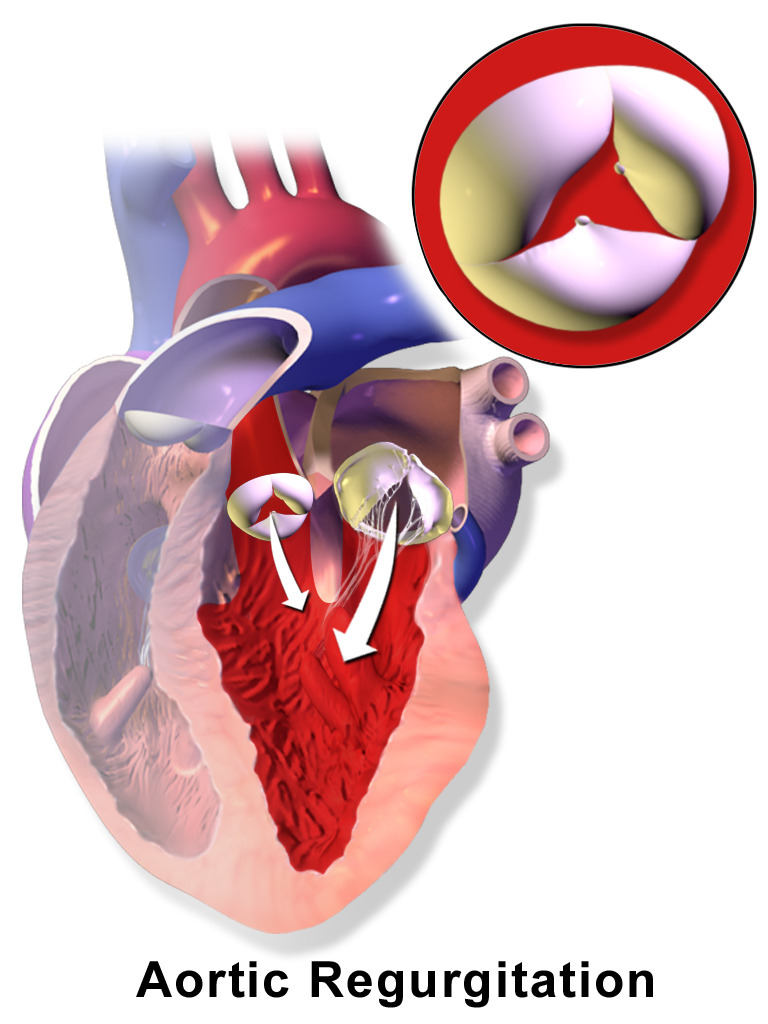Playlist
Show Playlist
Hide Playlist
Aortic Regurgitation – Valvular Heart Disease
-
Slides Valvular Heart Diseases.pdf
-
Reference List Cardiology.pdf
-
Download Lecture Overview
00:00 Okay, let’s talk for a few minutes about aortic regurgitation. Remember that aortic stenosis had relatively few causes. There was the congenital, there was the bicuspid, both of those in a sense are congenital. Rheumatic aortic stenosis much, much less common and consequently, when you see a patient with aortic stenosis, you just have to figure out, is this atherosclerotic aortic stenosis or was there a bicuspid valve, and you saw there was a different age range when they develop it. So, it’s usually not too hard to tell and the echo usually also helps us decide what the etiology is. In aortic regurgitation, it’s really often associated with other internal medicine diseases. So, of course, it could be from a bicuspid valve, it can be from patients with endocarditis who had a slightly abnormal valve to start with; the bicuspid valve has increased risk for endocarditis. It could be an occasional rheumatic that comes along, it can be individuals who have prolapse, individuals who have collagen-vascular disease. There’s a whole variety of things and some rare congenital diseases such as osteogenesis imperfecta and so forth. It turns out there are lots of different reasons for aortic regurgitation as opposed to aortic stenosis where you saw there were relatively few causes. Here are two sections from a two-dimensional echocardiogram and the rainbow stippling you see there is a large aortic regurgitant jet that’s pouring back into the left ventricle during diastole. 01:41 The murmur here is quite different from the murmur of aortic stenosis. Remember, the murmur of aortic stenosis is during systole when the valve… when blood is being ejected across the valve. The murmur in aortic regurgitation is during diastole when the aortic valve should be closed. So that what you here is let’s make an imitation again. Here’s a normal heart - lub dub, lub dub, lub dub. Here’s a patient with aortic regurgitation - lub dub swoosh, lub dub swoosh, lub dub swoosh and you can hear that usually, quite easily, particularly, if there’s more than just a trace of aortic regurgitation. 02:21 Here’s an unfortunate autopsy picture from a patient who developed endocarditis on a bicuspid valve and it’s not hard to see that the infecting bacteria have torn the valve apart. Often, this leads to acute regurgitation… acute severe regurgitation. These patients do not do as well as the patients with chronic aortic regurgitation. 02:44 With chronic aortic regurgitation, the heart has time to dilate a little bit, to increase its workload so that it’s able to pump the increased load of blood out with each stroke volume, but when there’s acute aortic regurgitation, the valve cannot… the ventricle cannot compensate for this valve abnormality and the result is severe aortic regurgitation. These patients need urgent valve replacement and of course, antibiotic therapy. 03:15 It turns out that in patients with chronic aortic regurgitation, actually there’s medical therapy that can delay the need for aortic valve replacement. Here was the first article. 03:25 This is from New England Journal some 20 years ago in which Nifedipine, which is a calcium channel blocker that dilates blood vessels and lowers blood pressure actually decreased the need for aortic valve replacement compared to placebo. How does this work? It works because by reducing the blood pressure and encouraging forward blood flow, you decrease the likelihood of aortic regurgitation and therefore, you decrease the stress on the left ventricle from the leak that… the leaking blood that falls back in the left ventricle during diastole. 03:58 It turns out that in subsequent studies, here come bearing another vasodilator Hydralazine with Enalapril which is an ACE inhibitor. Remember, blocks the renin-angiotensin system and is one of the most effective vasodilators we have. You can see that in these studies, actually Enalapril was better than Hydralazine and in other studies, the ACE inhibitors have turned out to be the best drug in chronic aortic regurgitation to delay the need for aortic valve replacement. In some patients with mild to moderate aortic regurgitation placed on ACE inhibitors, you may never need to replace the aortic valve. 04:34 The ventricle may compensate nicely and the patient lives to a ripe old age without valve intervention. That’s all I’m going to say about aortic regurgitation. It is much less commonly in need for aortic valve replacement compared to aortic stenosis.
About the Lecture
The lecture Aortic Regurgitation – Valvular Heart Disease by Joseph Alpert, MD is from the course Cardiac Diseases.
Included Quiz Questions
Which of the following is not a cause of aortic regurgitation?
- Cystic fibrosis
- Bicuspid aortic valve
- Rheumatic fever
- Endocarditis
The murmur of aortic regurgitation is best heard during which of the following phases of the cardiac cycle?
- Ventricular relaxation
- Ventricular contraction
- Atrial relaxation
- It is constant throughout the cardiac cycle.
Which of the following drugs is most appropriate for the long-term treatment of aortic regurgitation?
- Enalapril
- Atorvastatin
- Diltiazem
- Verapamil
- Propranolol
Customer reviews
2,7 of 5 stars
| 5 Stars |
|
1 |
| 4 Stars |
|
0 |
| 3 Stars |
|
0 |
| 2 Stars |
|
1 |
| 1 Star |
|
1 |
You only mentioned valvular defects leading to aortic regurgitation what about the aortic root defects? This lecture lacks so much more knowledge that we must know both for medical school exams and the USMLEs. For instance, where are the physical findings associated AR? The diastolic descrescendo murmur, wide pulse pressure, and S3 heart sound. The specific pulse patterns such as, Corrigan's pulse, water hammer, or pistol shot pulse patterns. How are patients with aortic regurgitation treated and etc? I've been seeing so much lack of consistency with lectures on lecturio recently.
Great information and so precise about every topic, I find this course very formative and hoping to learn more.
lack of information,very general information not deep to close to usmle step2




